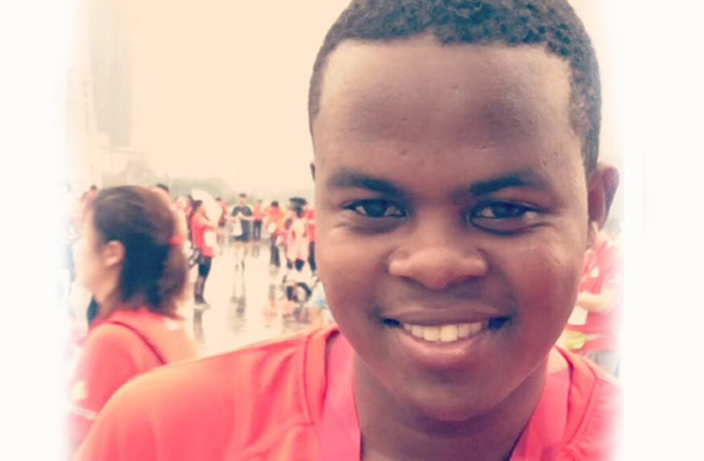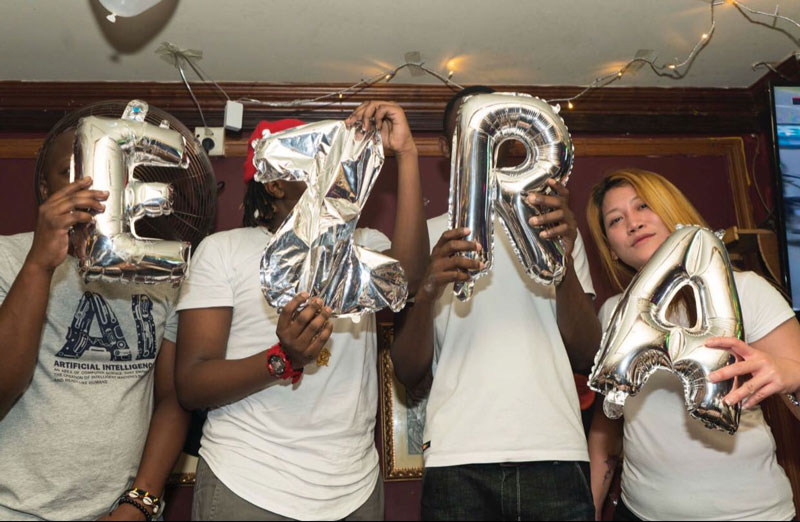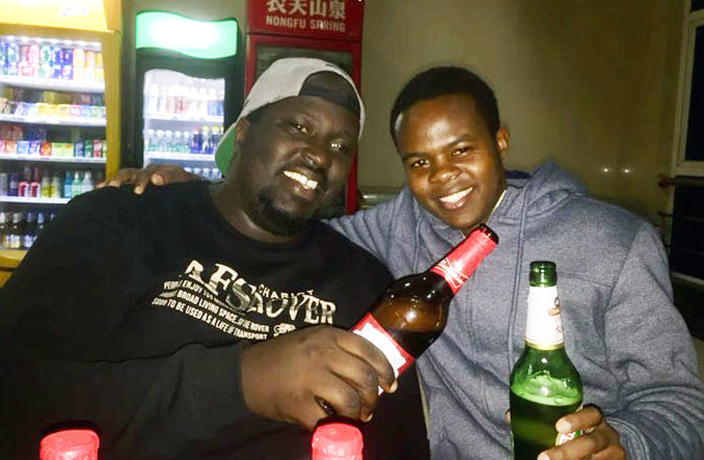It’s Friday, May 11, at a popular pub on Guangzhou’s Xingsheng Lu. At a table on the establishment’s first floor, a familiar face is conspicuously absent. Though the regular band has taken the stage, tonight they’re playing a very different tune. Friends and family have gathered to share what they will remember and loved most about Ezra Lei Kipngetich.
For those assembled, it’s hard to believe that less than a week prior, that same young face was pulled bloated and decomposing from the murky waters of a drainage canal near the city’s Pearl River. Two full days of heat and moisture had taken their toll but for Ezra's uncle Gideon Kipngetich, given the grim and bitter task of identifying his young nephew’s body, the face was unmistakable.
“It was summertime,” Gideon tells us, “and the body had been there since Friday. It was already decomposing because of the heat. It had absorbed a lot of water and the decomposition from bacteria was taking effect. The condition of the body was not good.”
How did the story of this ambitious young student, who arrived in China full of dreams and aspirations from the town of Eldoret in western Kenya, come to such grisly and heartbreaking end in only eight short months?
A Long Way From Home

“I grew up with Ezra,” Gideon, who has spent years working in Guangdong, told That’s. “He always wanted to follow me here.”
“When I came to China, after some time, my standard of living started to improve. So Ezra was like, ‘It looks like when you go there, you come back a different person. I want to go to China, too.’”
With this promise of a personal transformation in mind and the successful example of his relatives to follow (in addition to his uncle, Ezra had cousins living in Beijing and Harbin), the young man set out like many others before him for a new life in Guangzhou.
“His goal was to study medical technology,” Gideon explains. “Right now in Africa we still use obsolete or outdated devices. He saw the need to improve the state of technology and medical healthcare [on the continent] and wanted to understand these machines so he could introduce and supply them to Kenya and the rest of Africa.”
But before Ezra could set about pursuing this noble calling in earnest, he needed to learn the language. Ezra enrolled as a student of Mandarin at the South China University of Technology and set out to learn the lingua franca of his adopted home.
According to his friends and relatives, the 25-year-old dedicated himself to his studies, but also maintained an active social life. An avid runner, Ezra took part in local 10-kilometer races as well as last winter’s Huangpu Marathon. In the evenings, Ezra liked to meet friends for drinks or a game of pool.
One close friend, Kevin Kline, explains that, while Ezra was sometimes a “quiet guy,” he was a generous one too. “I remember on my birthday he came wishing me happy birthday and bought three beers telling me, ‘A big guy like you doesn’t deserve one beer on his birthday, take these three beers brother, and happy birthday.’”
Despite his busy schedule, Ezra always made time to meet with friends and family at the end of a long week. “Normally, every Friday, since he didn’t have an afternoon class, he would come and see me after lunch,” Uncle Gideon explains, “And then he would stay at my place until Sunday.”
Warning Signs
But on Friday, May 4, this familiar routine showed the first signs of beginning to unravel. That evening, Gideon proceeded to their usual meeting spot at the customary time. “We normally reserve the same table, but there was no one there,” he tells us. Assuming his nephew would be coming later, he was surprised when Ezra’s roommate showed up alone.
Calls to Ezra’s phone weren’t going through and the two became concerned. “This is strange – something must be happening here,” Gideon remembers thinking. “We stayed there the whole night waiting, till nearly 1am or 2am. But Ezra never came.”
“Then the next day, when I woke up,” Gideon recounts, “my calls to his phone still weren’t going through. So I decided to go directly to the school to look for him.” At the campus, Gideon encountered a friend of Ezra’s who had come to see his nephew the previous morning. The pair had arranged to travel together to a wholesale market popular with African traders to buy some clothes, once Ezra had finished his morning classes.
But when the friend arrived, he found Ezra seemingly confused and acting erratically. “Ezra left for class at around 8am,” Gideon learned. “He told this friend he was going to class, but on his way to class he turned around and came back a couple minutes later and told the guy, ‘Let’s go, let’s get out of this room. Let’s go to market.’ But then, on the way [to the market], he told the guy, ‘Ah no, no, no, no. I’m supposed to be going to class.’ So the guy was like, ‘What’s going on here? If you need to go to class, you should go to class. If you want to go to market, let’s go to the market.’”
Concerned, Gideon asked the friend to show him where he last saw Ezra. “From there,” Gideon tells us, “I went straight to the [school] police station.”
Tracking the Tragedy
Campus police reacted quickly to the news that Ezra was missing and unreachable, and quickly brought Gideon to the school’s surveillance camera office where they began pouring over footage from the previous day.
“I could see Ezra riding around the place [on a bicycle] like he didn’t know where to go, Gideon tells us, “He looked kind of depressed.”
Gideon’s mind went back to earlier in the week, when Ezra told classmates he was feeling under the weather. “They say he was sick on Monday.” Initially, Ezra attributed the illness to too much alcohol and told friends he would quit drinking.
“But it looks like he got sick again,” Gideon observed. “Probably, it was a mental issue. Maybe the sickness went upstairs and affected his brain. When he was doing those rounds [on the bike], just riding around, riding around… I could see that he was disturbed.”
Finally, Ezra abandoned the bicycle and exited the university campus on foot. “The school cameras are only operational up to the school gate,” Gideon explains, “So they told me to contact the city police to come and check their surveillance cameras along the road.”
“We found out that when he left the school gates, Ezra stayed in a place on the side of the road for a long time, like somebody who had lost their mind. Like he could not think anymore. Like somebody who is sick and cannot move,” Gideon tells us, recounting what he saw on the city’s surveillance camera footage. Then, suddenly, Ezra stood up and started energetically running around. He rushed across the road with apparent disregard for any oncoming traffic, and out of sight.
“They tried to check the cameras for another two days to see if there was anyone who entered that place, but there was no one around there.”
It’s evident from the video footage, Gideon suspects, that while Ezra did not seem to be seeking to harm himself, he was unable to effectively assess risks to his own safety and modify his behavior accordingly. It was this apparent obliviousness that would ultimately prove fatal.
The off-road area that Ezra had fled into was a patch of rough scrub near the banks of the Pearl River waterway system. It was very lightly trafficked and fell firmly outside of the city’s surveillance camera coverage network, which, for police and increasingly desperate family members, meant that Ezra’s video trail had abruptly run cold.
The search now turned towards locating a reliable witness that could point investigators in the right direction. “They tried to check the cameras for another two days to see if there was anyone who entered that place, but there was no one around there.”
Finally, after reviewing hours of footage, police identified two potential witnesses who were seen entering the off-camera area that Ezra had run into. One, a female sanitation worker, had seen no one matching the student’s description. The other – a fisherman, Gideon says – told police that he did indeed see a man like Ezra who was “running around and looking nervous, who looked like he was trying to hide.”
This witness pointed police towards the place that the frightened man had run to, where investigators discovered a grim memento: a familiar pair of shoes. Not far away, in an out-flowing drainage canal, were the waterlogged remains of Ezra Lei Kipngetich.
Aftermath

Friends and family gathered on May 11 to share what they remember and loved most about Ezra
“I don’t know how to put it for people to understand.” Gideon told us one week after he was asked to identify his nephew’s body, and less than two weeks after Ezra’s 26th birthday.
“It’s kind of rare for someone to go insane, crazy. But the importance of sharing [this story] is that it stops the speculation that maybe the police are bad people or that someone was murdered in Guangzhou and that they do nothing about it.”
Indeed, despite the shock and grief of losing his nephew, Gideon feels it’s important to set the record straight in confirming that the police conducted themselves efficiently and professionally. “When I was there, I could see the effort they put in. Some didn’t sleep for three days. Even the big officials. It’s something they actually gave their best [to resolve].”
“The police concluded that this guy was not murdered – it’s not homicide.”
But part of that thorough professionalism meant an insistence on finding the truth, and before conclusions about Ezra’s death and disappearance could be drawn, friends and relatives were each subject to police interrogation. The abundance of evidence, however, quickly made clear that though Ezra’s death was undeniably tragic, no foul play was involved.
“The police concluded that this guy was not murdered – it’s not homicide,” Gideon tells us frankly. “And it’s not suicide, because the behavior before that showed that this guy was having something like a mental illness [that rendered him temporarily unable to protect himself from danger]”.
Indeed, Ezra’s behavior immediately before disappearing from the monitored area of the street indicates a lack of awareness of potential risks posed by his surroundings. “Probably,” Gideon speculates, “Ezra reached that place and decided to take off his shoes and relax a bit,” after his draining episode of frenzied confusion earlier in the day. “Then maybe,” Gideon conjectures, “he got dizzy and fell in that drainage canal.”
“And this guy couldn’t swim,” his uncle adds wryly, “which was a problem.”
Saying Goodbye
The conclusion of the investigation was sadly not the end to the family’s hardship. Repatriation of foreign remains from the PRC has never been easy. Tight interprovincial regulations and a preponderance of red tape combine with near-monopolies on the part of funeral parlors in handling foreign corpses to create a vulnerable position for grieving families. In 2012 alone, a year when roughly 1,500 foreigners died in the country, only a single funeral home in all of Guangdong province was legally entitled to process their remains, and would charge roughly RMB36,000 for the privilege, according to China Daily.
Cremation, widely practiced across China, remains an expedient option. But for Ezra’s relatives, Kalenjin Christians from Kenya’s west, the idea was initially unthinkable.
“My people said, ‘We are Christians, we cannot do that. We do not cremate bodies – we bury them.’” Despite their conviction that Ezra’s body must be returned in its entirety to be interred in Kenya, they encountered nothing but obstacles in trying to accomplish the task.
At the time Ezra’s body was discovered, the police investigation into his cause of death was ongoing. This meant that his remains were immediately taken into custody by authorities and frozen to preserve any potential evidence.
“The transportation company said they could not handle that kind of body,” Gideon recalls, “because the minute it emerges from the freezer, it will defrost – the ice will melt and it becomes some kind of unhygienic thing.”
Instead, a freezer-like casket would have to be procured which, to complicate matters further, would need to be connected to a constant source of power for the duration of its long transit back to Kenya.
An outpouring of donations from friends and community members seeking to help with this expensive and bureaucratically complicated prospect quickly accumulated in the wake of Ezra’s death. “It reached a point when I said that it should not continue, I should not accept more contributions.” Gideon tells us, “But some people still wanted to give, some people say: ‘We don’t care, we just want to care for the family, console the family. We just want to do our part.’ If I say no, they still give anyway.”
“If someone is missing and out of touch for even two or three hours, and that it’s not a normal thing for that to happen, it’s important to look for people. Because people can disappear. Just like that.”
Ultimately, however, the procedural hurdles proved too great for even the combined financial force of a grieving community and the intervention of the Kenyan embassy in Beijing. The transportation company in the city legally allowed to handle the repatriation of foreign remains insisted it was unable to source a freezer-casket at any price. Ezra’s father in Kenya was forced to procure a passport, buy an air ticket to Guangzhou, reluctantly cremate his son and retrieve the ashes.
While it is indeed tragic that Ezra’s family was compelled by lack of infrastructure and regulatory inflexibility to follow their own wishes and customs – cremation is after all, as Gideon reminds us repeatedly, “something new to [Christian] Africans, something strange” – the family is also adamant that that deciding to burn the body should not be looked upon with stigma or shame.
Gideon wants people who find themselves faced with a similar decision in the future to “take courage” and know that it’s sometimes necessary to adapt religious convictions in the face of necessity, at least to avoid prolonging grief and hardship.
“After living in China for many years, I feel like I’m converted.” Gideon tells us. “People should know that it’s okay to make life simpler for yourself when you’re hit with something huge like this.”
But the best advice the grieving man has to offer is to take steps to avoid such a tragedy from transpiring in the first place. “No one should take things for granted,” Gideon concludes, “If someone is missing and out of touch for even two or three hours, and that it’s not a normal thing for that to happen, it’s important to look for people. Because people can disappear. Just like that.”
[Images courtesy of Gideon Kipngetich]





















0 User Comments